
In 1972, the first-ever faculty of environmental chemistry in China was established by PKU’s pioneering environmental scholars. Marking its 50th anniversary in 2023, the College of Environmental Science and Engineering (CESE) looks back on half a century of national and global developments in the environmental field.
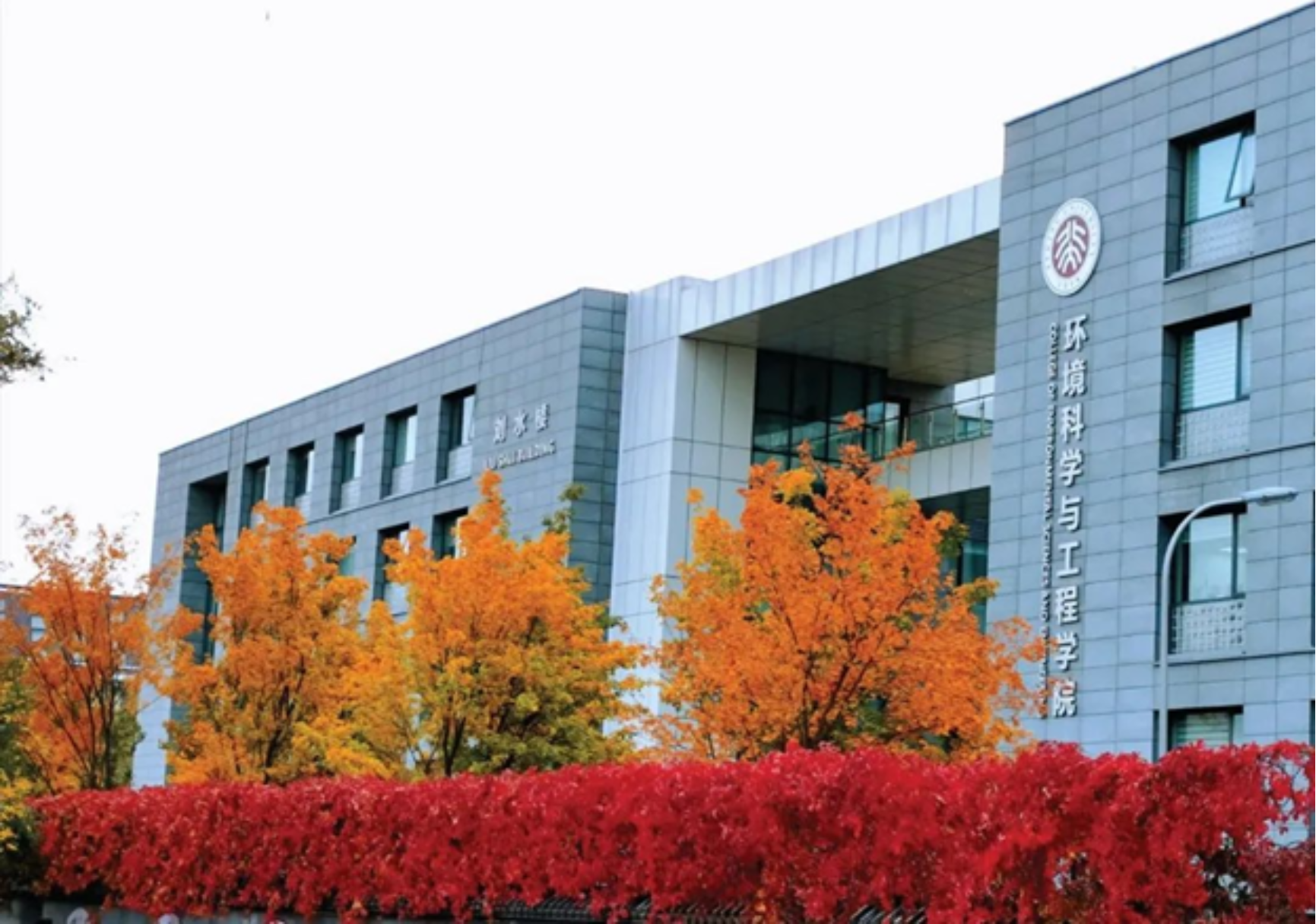
Liushui Building of PKU College of Environmental Science and Engineering
In search of a new path
The 1972 United Nations Conference on the Environment held in Stockholm was the first-ever conference on environmental issues, at which the Chinese delegation played a pivotal role in making the conference a success.
United under the slogan “Only One Earth,” a new era of global environmental governance and collaboration has dawned. China’s journey in environmental protection was also ready for new beginnings. An older generation of scientists including Prof. Tang Xiaoyan and Prof. Ye Wenhu from PKU were searching for ways to contribute their knowledge in tackling environmental issues.
Reflecting on her brave decision 50 years ago to transition from studying chemistry to working in environmental sciences, Tang remains fully determined and confident. "Premier Zhou Enlai suggested that our nation needed home-grown scientists, which deeply moved me. Environmental chemistry could play a significant role in impacting public health for generations to come," she recalls. "We needed to get started on environmental chemistry, which would be something significant."
Under Prof. Tang's leadership, PKU's Faculty of Environmental Chemistry, the first of its kind in China, developed the country's first textbooks on recycling and kick-started teaching and research in environment-related subjects.
In the summer of 1974, Wu Renming, a PKU alumnus, observed air pollution occurring in the Xigu region of Lanzhou in Gansu Province, northwest China every summer. He invited Prof. Tang’s team to investigate the cause of the haze. Despite lacking equipment, data, and prior experience, the team started from scratch to set up the first field observation experiment and simulation in China, which combined the fields of atmospheric chemistry and atmospheric physics. Later, the team designed and constructed China's first smog chamber to study photochemical processes using environmental simulation and developed an early numerical model of urban air quality.
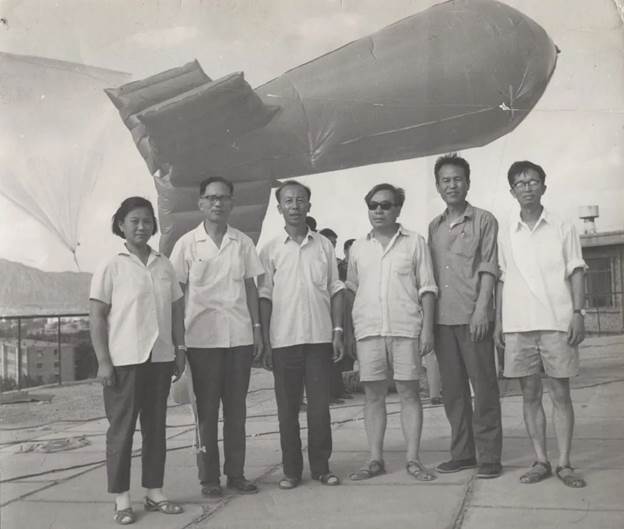
Tang Xiaoyan, Wang Wenxing, Huang Jianguo, Ren Zhenhai, Chen Changhe, and Peng Xian’an (from left) in Lanzhou in 1981
Building on their success in researching photochemical smog, Prof. Tang Xiaoyan's team contributed to research on acid rain in the 1980s and to Beijing's study of air pollution in the 1990s. In 1997, Prof. Tang proposed the "Air Pollution Complex" model to capture the mechanism of air pollution on the particulate level.
Meanwhile, Prof. Ye Wenhu, who had been studying turbulence, also switched his career focus to environmental protection. Under the guidance of his supervisor, Mr. Zhou Peiyuan, Prof. Ye participated in China's first-ever environmental assessment, providing a comprehensive assessment of over 350 square kilometers in the western suburbs of Beijing.

Ye Wenhu (third from right) and Zhou Peiyuan (third from left) at PKU in October 1964
PKU's Center for Environmental Sciences was founded on the beautiful campus of Yanyuan in 1982, emerging from the crossroads of multidisciplinary research. Top scholars from diverse backgrounds were united by a common concern for environmental issues. Founding members included Tang Xiaoyan studying environmental chemistry, Ye Wenhu studying environmental aerodynamics, Wang Enyong, Guan Boren, and Chen Jingsheng studying geography, Jin Ruilin of environmental law, Chen Jiayi of atmospheric physics, as well as Chen Jingsheng and Chen Changdu studying ecology. Leveraging their expertise, these professors worked together to pave the way forward for Chinese environmental studies.
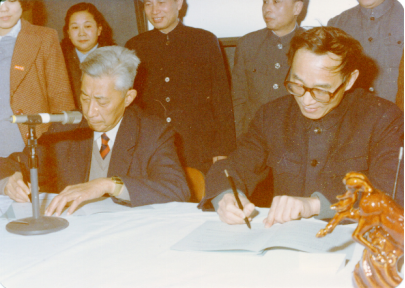
The signing ceremony of a partnership agreement on the establishment of the Center for Environmental Sciences in 1986
In 1986, the national Environmental Protection Administration and Peking University signed a partnership agreement on the establishment of the Center for Environmental Sciences. In 1993, the China Center for Sustainable Development Research was established with the collective effort of 13 Schools and Institutes of PKU. Prof. Ye Wenhu was appointed as the founding director of the Center.
PKU's Environmental Engineering program is at the forefront of developing new engineering programs for the modern context. Emerging from a collision of a plethora of ideas, environmental engineering has created and perfected a pathway that marries science and engineering. Looking back on the journey of trailblazing, Prof. Ni Jinren, an academician of the Chinese Academy of Sciences (CAS), considers the establishment of the Institute for Environmental Engineering in 1994 as an important milestone in exploring engineering research at PKU. For Prof. Ni, the greatest challenge in developing environmental technology lies in maximizing a system's ecological benefit while minimizing material and energy consumption.
In 2000, Academician Zhu Tong and his team at PKU attached importance to the interdisciplinary study of environmental sciences and health sciences as a timely response to their country's call to prioritize the health and well-being of its citizens. However, the actual implementation was harder than expected. "At the very beginning, we knew nothing about medicine. Our colleagues with health science backgrounds also knew little about environmental issues. We devoted a lot of time and effort to communicating and teaching ourselves about completely new fields," recalls Prof. Zhu.
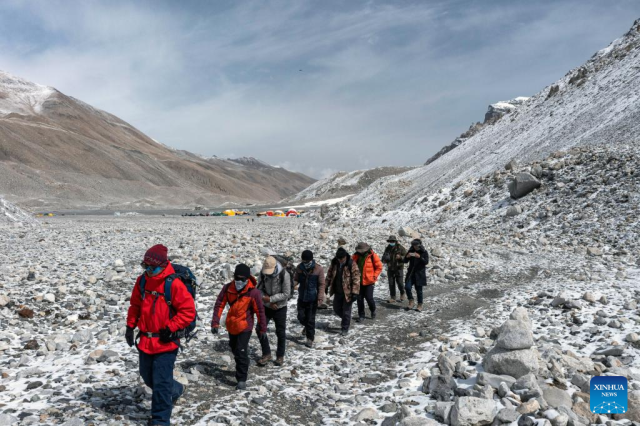
Aerial photo taken on May 1, 2022 shows members of a scientific research team marching towards East Rongbuk glacier on Mount Qomolangma.
With determination, these trailblazers from PKU leaped beyond their comfort zones, embraced challenges, and overcame numerous difficulties. The growth and expansion of the cross-disciplinary study of environment and health was a testimony to their passion and hard work. In 2021, the first Department of Environmental Health was established in China. The Department closes the loop in the model of modern environmental studies, integrating science, engineering, and management to safeguard people's health, achieving the ultimate goal of environmental sciences.
In recent years, PKU scholars have made numerous breakthroughs in environmental research and development. The results of their work have been published in top journals, including Science, NSR, Lancet, Nature partner journals, and PNAS. PKU's researchers have also been recognized with accolades, including second-class awards of the State Natural Science Award, second-class awards of the State Scientific and Technological Progress Award, second-class awards of the State Technological Invention Award, and various international awards.
The perseverance of the research community in serving the country
PKU CESE is committed to serving the country's major strategies with solid, forward-looking preliminary research. In the past decade of rapid improvement in China's environmental quality, PKU CESE students and faculty members have traveled all over China to contribute to national pollution prevention and control campaigns. The overall design of the country's major science and technology programs in atmospheric and other areas is being shaped by PKU CESE.
In the national "Air Pollution Action Plan," students and faculty members have focused on researching the causes of air pollution in key regions such as Beijing, Tianjin and Hebei, the Pearl River Delta, the Yangtze River Delta, Sichuan, and Chongqing, and have made significant contributions to the continuous improvement of air quality in many places.
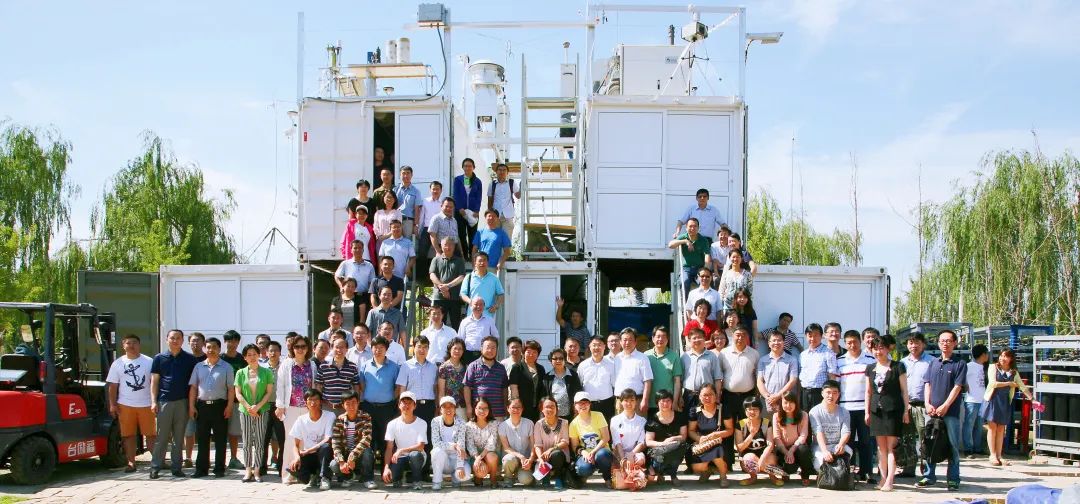
In 2013, a scientific experiment on integrated observation of regional air pollution was conducted in Wangdu, Hebei
In 2006, to help realize the promise of a 'Green Olympic,' Zhu Tong led an international collaboration project called CAREBEIJING, which was a joint effort of the provinces and cities around Beijing to collectively tackle air pollution. As a tribute to the Beijing Olympics, PKU CESE worked to improve the capital's air and sky quality.
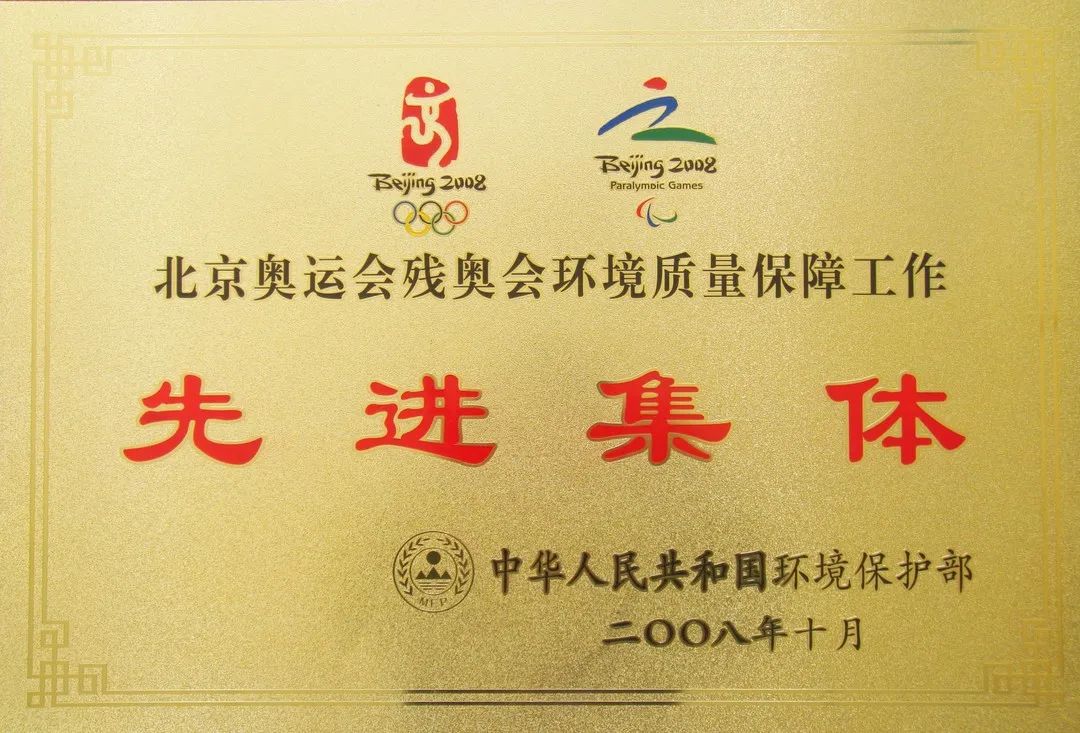
Peking University was Awarded Advanced Group in Air Quality Assurance for the 2008 Beijing Olympic and Paralympic Games
Since 2013, in response to the increasingly serious and prominent problem of air pollution in China, the state has taken a "heavy-handed" approach, and PKU CESE has been fully engaged in the national research project on the causes and treatment of heavy atmospheric pollution.
The story behind the Big Air Shougang at the 2022 Beijing Winter Olympics is not only about the transformation of a century-old factory but also the result of the persistent efforts of a PKU CESE member.
Tang Xiaoyan was acutely aware of the grave impact that Shougang Park's emissions could have on Beijing's air quality - a problem that could not be ignored. As early as the late 1990s, she repeatedly appealed to the Beijing Municipal Government and national authorities to relocate Shougang Park for the sake of improving the city's air quality in the long term. Eventually, the idea of relocating Shougang Park gradually gained traction as people became more conscious of environmental issues and the need to ensure air quality for the 2008 Olympics.
With the growing public consciousness about environmental protection, water quality security and water source protection have become some of the most significant water issues for people. PKU CESE is committed to addressing these issues, and has made significant strides in this regard. For instance, they have resolved key technical problems associated with the national South-to-North Water Diversion Project, which is aimed at providing water to the water-scarce north from the water-rich south. Additionally, they have contributed to ensuring the safety of potable water sources in villages and towns.
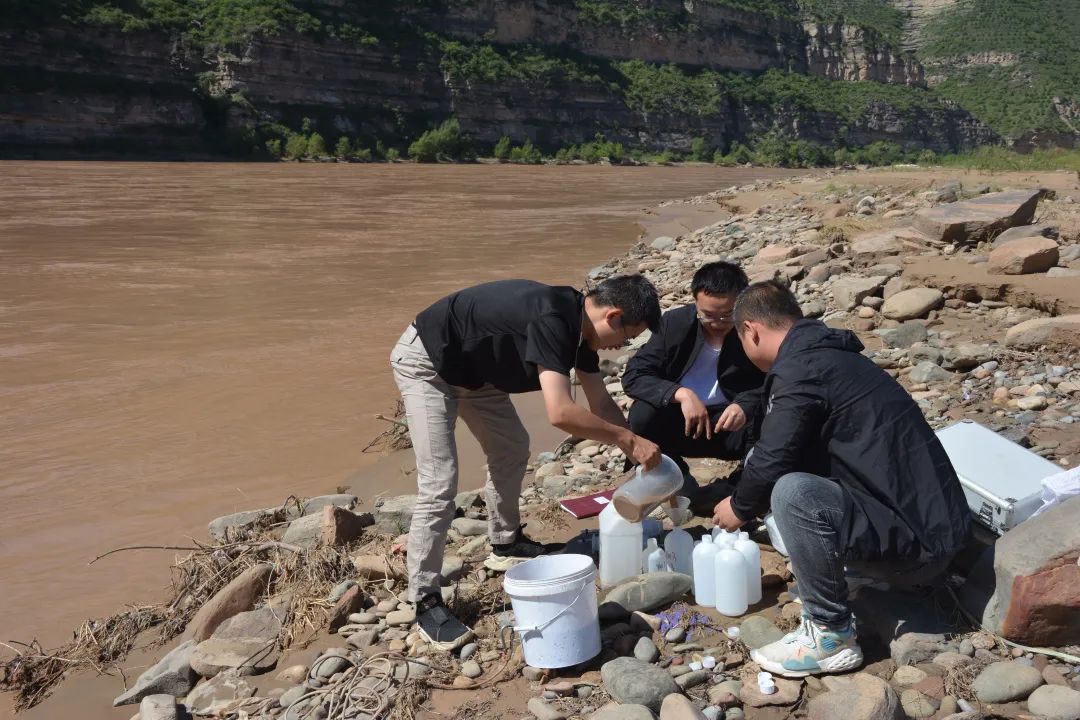
Environmental Engineering students taking water samples of the Yellow River in April 2021
PKU was the first to conduct research on ozone-depleting substances (ODS), persistent organic pollutants (POPs), chemicals, and biodiversity in China.
In 1993, the PKU team was awarded the special gold medal of the National Award for Contribution to the Protection of the Ozone Layer, the United Nations Environment Programme (UNEP) Award for Contribution to the Protection of the Ozone Layer, and shared the Nobel Peace Prize as a member of the IPCC.
In the ever-changing international arena, global environmental governance and cooperation face many opportunities and challenges. In this process, PKU CESE has demonstrated China's wisdom and action to the world.
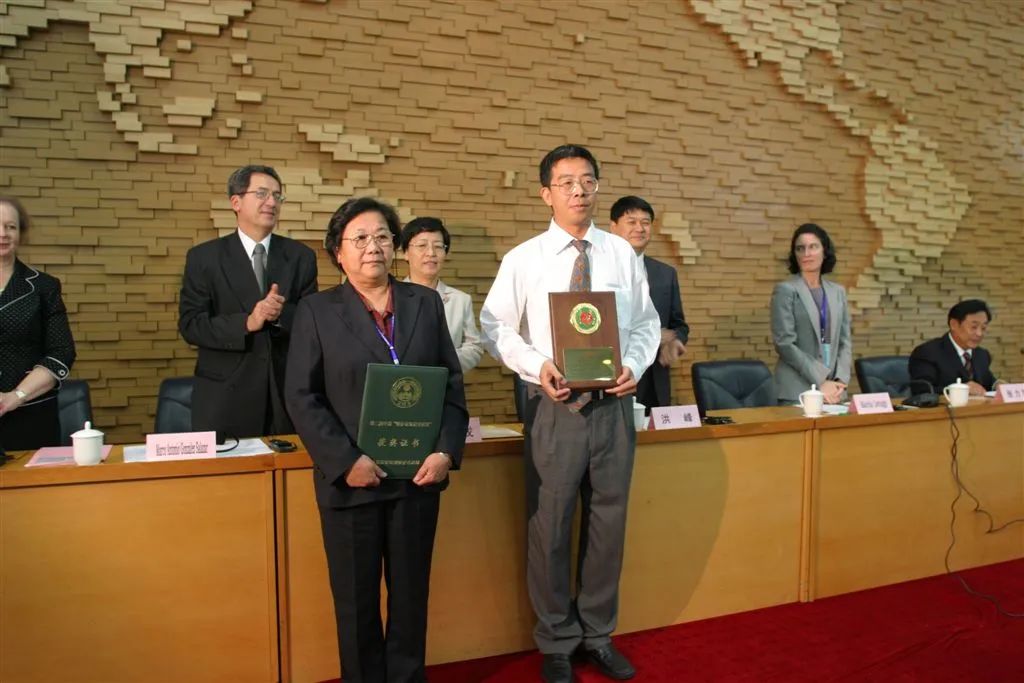
In 2004, the Working Group was awarded the Special Gold Medal of the 2nd China Contribution Award for the Protection of the Ozone Layer (front row, left, Tang Xiaoyan, right, Hu Jianxin)

In 2005, Academician Tang Xiaoyan received the Special Award for the 20th Anniversary of the Vienna Convention for the Protection of the Ozone Layer
As early as 2001 and 2002, and again in 2005 and 2006, Zhu Tong, one of the leaders of the " Mount Qomolangma Monitoring 2001 Expedition" project, led teams to collect measurement data on several parameters of the air in Tibet, which is considered clean and non-polluted. Their research achieved landmark results in atmospheric oxidation on the Qinghai-Tibet Plateau and cross-border transport of persistent organic pollutants in South Asia.
Since 2017, with the support of the second holistic scientific expedition to the Tibetan Plateau, the PKU environmental health team has conducted research on "Atmospheric fortification of the Tibetan Plateau." In 2019, they conducted research in Namucuo, followed by research in Linzhi and Lulang in 2021. The team also conducted a four-month-long research project on "Endemic diseases and plateau physiology in high mountains" in Lhasa and Linzhi in 2021. These projects illustrate the significance of the new engineering discipline in serving public interests.
During the "Peak Mission" Mount Qomolangma scientific research in May 2022, Zhu Tong led the "Atmospheric Environment and Human Health" scientific research team, along with scientific research teams from all over China, to explore the laws of atmospheric evolution and environmental health mysteries on the snowy plateau. At the top of the mountain, they pushed the limits of what is possible, carrying weights at over 5,000 meters and obtaining valuable data on physiological adaptation to high altitude, thus exploring the effects of plateau reactions on the human body. For the first time in the Mount Qomolangma region, they released their own ozone balloon, which reached a maximum altitude of 39.1 km. The data on the chemical composition of the atmosphere will serve as a key code for deciphering the evolution of the atmosphere of the Mount Qomolangma region on the Tibetan Plateau.
A new proposition for green development
Over the past 50 years, starting from 1972 and ending in 2022, the world has witnessed the remarkable journey of global environmental protection. This period has served as a yardstick, measuring the trek and tide of environmental protection efforts worldwide. These five decades can be compared to a magnificent picture that depicts the stormy years of China's environment and the green transformation of the Earth.
During these years, countless ecological and environmental workers, including those from PKU, have demonstrated tremendous courage in their efforts to construct a beautiful China. The modernization that China is building emphasizes the importance of people and nature living together in harmony. Therefore, environmental disciplines and talent development need to keep up with the times to support this vision.
The College of Environmental Sciences and Engineering at Peking University will leverage the university's holistic academic disciplines, including arts, science, engineering, and medicine, to serve the important national strategic needs of ecological civilization. It will work with colleagues in the environmental community both locally and globally to support the achievement of global sustainable development goals. The College will make new efforts to build a clean and beautiful world where people and nature coexist in harmony, and work towards a community with a shared future for mankind!
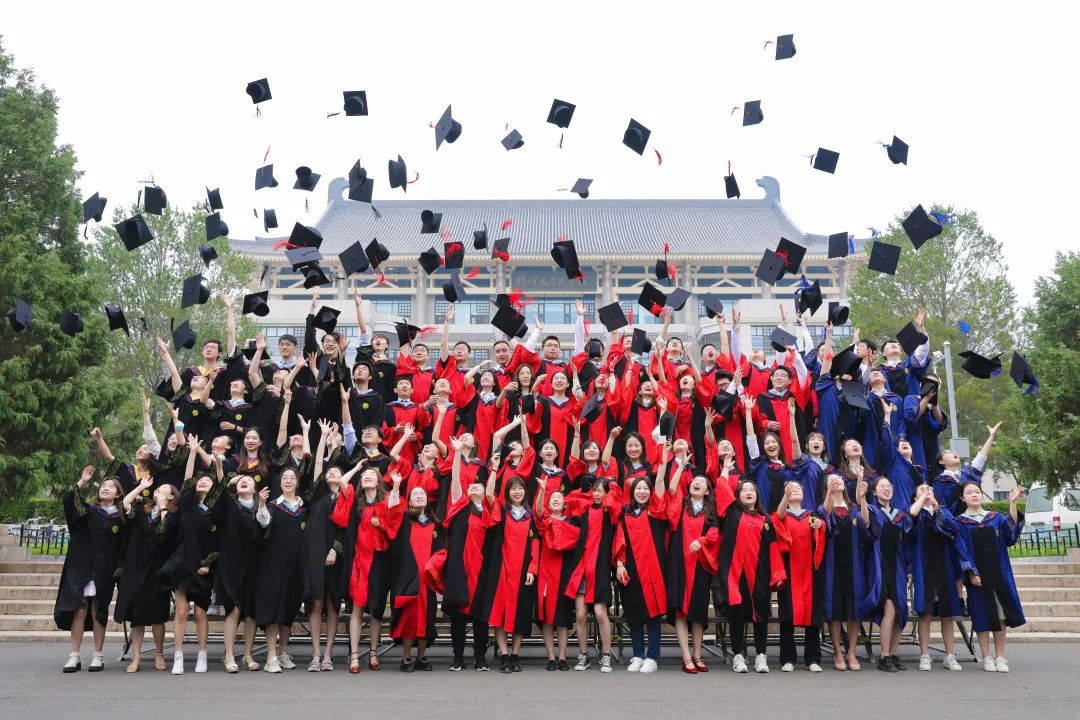
Group photo of the PKU College of Environmental Sciences and Engineering Class of 2022 graduates